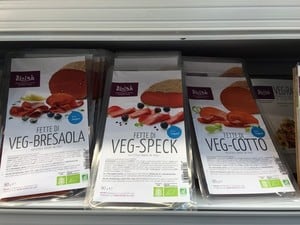Paolo de Castro from the Socialists and Democrats party and Giovanni La Via from the European People's Party sent a written question to the Commission last month.
Although European legislation prohibits food manufacturers from using dairy terms to market their analog products, such as cheese or dairy, there are no equivalent rules for meat products.
As more consumers adopt meat-reducing eating habits for both environmental and ethical reasons, the meat alternative market is seen as increasingly lucrative – attracting even the interest of a number of meat processors investing in the space.
Yet, as in the dairy sector, there is resistance to manufacturers of plant-based products using traditional meat terms.
The MEPs ask the Commission: "Since there is currently no clear European legislation protecting certain names, and the market is saturated with this type of

product, does the Commission intend to intervene and regulate this particular sector, [and] to introduce European legislation to safeguard certain names relating to meat products, as is the case for dairy products?”
Misleading meat
Paolo de Castro told FoodNavigator the practice of using meat terminology for vegan or vegetarian alternatives is carried out in order to influence consumers to buy products that are “improperly defined”.
“From the nutritional point of view, it could be quite misleading to present a vegetable product just like an animal one, which, of course, shows different nutrient profiles, methods of production and origin.”
De Castro and La Via’s written question gives the examples of vegan bresaola, vegetarian prosciutto and vegan mortadella.

“In all those examples we can recognise three protected designations of origin,” he said.
Protected Designation of Origin (PDO): Covers agricultural products and foodstuffs which are produced, processed and prepared in a given geographical area using recognised know-how.
Protected Geographical Indication (PGI): Covers agricultural products and foodstuffs closely linked to the geographical area. At least one of the stages of production, processing or preparation takes place in the area.
Traditional Speciality Guaranteed (TSG): Highlights traditional character, either in the composition or means of production.

Mortadella Bologna and Bresaola della Valtellina have a PGI label while eight different varieties of prosciutto benefit from either a PDO or PGI label.
“The abuse therefore is not only addressed to a generic name, but also to a specific product," said de Castro. "The world-known good reputation of many meat products is often connected to their methods of production, with their traditions and typical culture.
“We therefore cannot accept a market practice, where EU protected products can be related and confused with completely different typology of foodstuff, and so deprived of the raw materials and exclusive features that make their taste and appeal unique for consumers throughout the world.”
Yet according to the European Vegetarian Union the traditional meat terms are simply used to guide consumers to the products they want. Public affairs officer Jan Felix Domke told us: "Typically, vegetarian alternatives are developed and produced in order to match the 'original' as closely as possible. Terms such as 'sausage' transport a great amount of information to the customer (shape, texture, taste, how to prepare it, etc) which is why traditional terms are useful.
"And typically, the vegetarian 'character' of the product has been made unmistakably clear (a fact that the MEPs omit), commonly by using words such as 'vegetarian' or 'vegan'. We are not aware of anything pointing towards misled or confused customers."
A weighty question
According to food law expert and managing director of Hylobates legal consultancy, Luca Bucchini, it could be possible to see the Commission acting on the politicians' request.
"The two politicians are prominent MEPs, with experience chairing committees. In fact Mr De Castro is a former minister and former chair of the European Parliament's Committee on Agriculture and Rural Development and Mr La Via chairs the Committee on Environment, Public Health and Food Safety (ENVI). So their question carries weight," he said.
"In fact the request is such that the legal changes required are not too difficult to put in place if most member states agree. If it were to happen, it would be an interesting case for the European Parliament actually promoting legislation."
